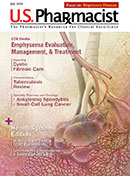Philadelphia—New evidence suggests that the disease itself, not just treatment, could be behind the high rate of impulse-control disorders in Parkinson’s disease (PD) patients.
Impulse-control disorders, including compulsive gambling, buying, sexual, and eating behaviors are believed to occur in as many as 20% of Parkinson’s disease patients over the course of their illness.
A study in the European Journal of Neurology sought to determine the frequency, demographic, and clinical correlates—age, sex, disease severity and dopaminergic treatment—of impulse-control disorder symptoms and related behaviors in patients with PD, with and without dementia.
To do that, an international study team involving the University of Pennsylvania analyzed historical data from a national, multi-center, cross-sectional database and assessed impulse-control disorder and related behaviors with the Scale for Evaluation of Neuropsychiatric Disorders in Parkinson's Disease. The survey was administered as a semistructured interview to 85 patients with dementia or caregivers and 444 patients without.
Researchers determined that dopamine-agonist therapy use was common and similar in the two groups (78.8% in PD-D vs. 82.9% in PD-ND), but impulse-control disorders (23.5% vs. 13.3%, P = .02), hobbyism-punding (32.9% vs. 10.6%, P < .001) and dopaminergic medication abuse (8.2% vs. 3.2%, P = .03) were more common in the PD-D group.
“The finding that ICDs and related behaviors are more common in patients with PD frequently treated with dopamine agonists who also have comorbid dementia suggests that the neural substrates associated with PD dementia may also predispose to development of compulsive behaviors, the authors concluded.
« Click here to return to Weekly News Update.
Impulse-control disorders, including compulsive gambling, buying, sexual, and eating behaviors are believed to occur in as many as 20% of Parkinson’s disease patients over the course of their illness.
A study in the European Journal of Neurology sought to determine the frequency, demographic, and clinical correlates—age, sex, disease severity and dopaminergic treatment—of impulse-control disorder symptoms and related behaviors in patients with PD, with and without dementia.
To do that, an international study team involving the University of Pennsylvania analyzed historical data from a national, multi-center, cross-sectional database and assessed impulse-control disorder and related behaviors with the Scale for Evaluation of Neuropsychiatric Disorders in Parkinson's Disease. The survey was administered as a semistructured interview to 85 patients with dementia or caregivers and 444 patients without.
Researchers determined that dopamine-agonist therapy use was common and similar in the two groups (78.8% in PD-D vs. 82.9% in PD-ND), but impulse-control disorders (23.5% vs. 13.3%, P = .02), hobbyism-punding (32.9% vs. 10.6%, P < .001) and dopaminergic medication abuse (8.2% vs. 3.2%, P = .03) were more common in the PD-D group.
“The finding that ICDs and related behaviors are more common in patients with PD frequently treated with dopamine agonists who also have comorbid dementia suggests that the neural substrates associated with PD dementia may also predispose to development of compulsive behaviors, the authors concluded.
« Click here to return to Weekly News Update.





